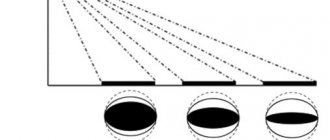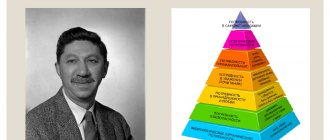Definition 1
Organizational psychology is a branch of psychology that serves for the practical application of psychological principles and effective methods for building a business and competently managing a company.
The ultimate goal of organizational psychology is to improve employee productivity and satisfaction with the work process in the organization.
Organizational psychology contains several important divisions. Let's take a closer look at each of them.
Organizational psychology
Organizational psychology, or labor psychology , is an applied science where practice and work in the “field” are of decisive importance. The main conductors of labor psychology are psychologists and personnel officers working at the enterprise. Constant improvement and change of labor processes is their responsibility; on the other hand, collecting information about labor processes allows us to develop the theoretical basis of labor psychology. The subject of observation and research in organizational psychology is the behavior of people in organizations and mental phenomena.
Main problems and their features
It is customary to talk about three circles of difficulties, the solution of which is possible using the approaches of new psychological science. The first block was conventionally called the “working person.” It involves recruiting staff and selecting the best candidates, distributing workers to achieve optimal results, followed by training people. This includes problems of socialization of personnel, motivation of workers, and ensuring a sufficient level of satisfaction for them. The first set of difficulties includes the loss of temporary resources, turnover, and employee loyalty to the company.
The second block of difficulties was conventionally called “work”. Within its framework, the psychology of organizational behavior deals with the planning of work processes and the formation of working conditions. This includes aspects of the safety of the hired person, the level of well-being of workers, and their state of health. This block includes features of performing work tasks and measuring work, as well as professional studies and assessment of labor costs.
Psychological service
Psychological service is a structural unit of an organization that uses psychological methods in its work, on the basis of which hiring is carried out, planning the strategy and tactics of the organization, and further development is predicted. The staff of the service includes specialists in the field of organizational psychology, labor psychology and psychology of the field in which the organization operates. The psychological service was introduced into the activities of organizations not so long ago, but has already shown its necessity in work activities. A full-time psychologist monitors not only the life of the enterprise, but also takes into account the factors influencing the work activity of employees, and strives to reduce their negative impact and increase the positive. To this end, the enterprise creates its own infrastructure, which includes medical care, cultural and leisure programs, and the provision of tourist recreation centers for the employee and his family, which allows stimulating employees to form an attachment to the enterprise.
About the technique
Organizational methods in psychology include observing workers and conducting regular surveys of employed people. Persons in charge of the work must carry out experimental research from time to time. It is necessary to use special methods, determined by the characteristics of a particular enterprise, selected based on it. All methods should be used comprehensively, simultaneously, cumulatively. Surveys and observations allow the psychologist to accumulate a maximum of useful information, which can then be used in the work process. This database is the basis for suggesting what measures will optimize the work process and make it more efficient. The task of a psychologist is to suggest options and ways that can be implemented in practice. At the same time, experiment is the main method of clarifying the reasonableness of a proposal. Personnel training can become special methods within a particular enterprise.
The application of organizational methods in psychology has certain difficulties. Currently, any psychologist is forced to work in conditions of increased complexity. Certain problems are caused by the organization of research activities and the formation of plans. It is no less difficult to translate a well-thought-out solution into reality.
Position of psychologist in the organization
The position of a psychologist in an organization is provided to persons with higher specialized education. Priority is given to experienced workers with at least three years of work experience. The specificity of a psychologist’s work implies a responsible attitude towards one’s duties and the presence of the appropriate personal qualities necessary for this work. The presence of a psychologist position indicates a developed, modern enterprise, focused on introducing innovations, caring for employees, focusing on modern work methods, and adequate perception of the labor market.
Reality and Science
What constitutes human behavior within the framework of scientific research, Davis and Newstrom tried to formulate in their works. The most significant work of the authors was published in 2000. Organizational behavior, studied by science, is human behavior as applied to individuals and groups within an enterprise. It is expected that the knowledge obtained during the research will be further used in practice.
Research conducted in this area makes it possible to identify the most successful ways to improve staff performance. Organizational behavior, studied by organizational psychology, is becoming a scientific discipline with an impressive and constantly growing body of data, including conceptual works. At the same time, organizational psychology acts as an applied field of knowledge. It is she who ensures the dissemination of information about the successes and failures of various enterprises. Other firms can benefit from the experimental experience of companies that have already done something.
Job responsibilities of an organizational psychologist
In order for a psychologist to be effective and justified, he needs not only theoretical knowledge and skills in this area, but also experience, objectivity, the ability to analyze problem areas and correctly define them and be able to solve all the problems that arise related to the field of work psychology. The professional skills necessary for the effective functioning of an organizational psychologist cover a wide range of his actions in performing professional functions and responsibilities. He needs to be able to objectively and comprehensively analyze the conditions and factors, goals and objectives of the worker’s work and life. The job responsibilities of an organizational psychologist include:
- studying the human factor in the work activity of an enterprise;
- search and selection of personnel;
- development of selection tools - tests, questionnaires, interviews, etc.;
- monitoring employee skills;
- assistance in organizing work and workplace of employees;
- participation in the development of product design;
- development of the company brand;
- advertising of the organization's products;
- Conducting marketing research of the market into which the organization's products are supplied.
The psychologist’s activities are aimed at achieving maximum efficiency of employees, quality, convenience and external attractiveness of the company’s products and ensuring that the organization is recognizable and respected in the market.
About the nuances
In educational courses at institutes, organizational psychology is presented as a young science, still developing, so people specializing in it are forced to regularly face difficult situations. It is noted that the management personnel of an enterprise are not always able to adequately assess what is happening within the enterprise entrusted to them. Many managers find it difficult to understand that specific changes are already needed. A psychologist can suggest such measures, but more often he encounters resistance from those in charge rather than agreement to innovations. People tend to rule out possible innovations for as long as possible. This is largely due to the need to invest money in carrying out experiments, the results of which are sometimes impossible to predict. The management's desire to save money becomes a serious obstacle in the work of a psychologist.
Specialists who have received education in the field of organizational psychology at institutes are well aware that in practice, working in this specialty is a rather difficult task. To some extent, this is due to the problem of determining the mutual connections characteristic of a person’s psychological response and his behavior. Manifestations characteristic of behavior are quite specific, multifaceted, and not always obviously determined by a psychological response. When you need to limit this to the boundaries of the company and discover the root causes of this or that phenomenon and action within it, this becomes an even more difficult task.
However, all the current difficulties do not prevent psychologists from being indispensable employees of an enterprise that wants to reach new heights. Involving an experienced specialist allows you to increase the productivity of the work process, makes it possible to timely identify difficult situations and problems, and take measures to eliminate them.
Principles of personnel selection
One of the important tasks in labor psychology is the development, justification and application of a system of professional psychological selection. Assessing the professionalism of a candidate for a vacant position or an existing employee and determining professional suitability is what professional selection is mainly aimed at. Research in this area has been going on for over a hundred years, and it has brought positive results. It was found that individual psychological, physiological characteristics, professional training, and other characteristics are associated with indicators of productivity and labor safety.
G. Munstenberg introduced professional selection and made a huge contribution to its popularization. It cannot be said that it was G. Munstenberg who became the founder of professional selection, since many psychologists were involved in it before him. But it was they who proved the advantage of the scientific experimental psychological approach in identifying professionalism among employees in comparison with intuitive or everyday ideas. The followers of G. Munstenberg used slightly different methods during professional selection, namely: they studied professional selection using the methods of differential psychology, while only some functions were studied, for example, memory, attention. Research on neuropsychic stress during work was also actively used and experiments were carried out to study the candidate, etc.
The emergence of professional selection significantly reduced the time employers spent on incompetent employees, as it made it possible to overcome the discrepancy between the candidate and the position, profession, and the method of professional selection helped to achieve high results in the efficiency of work, while achieving maximum satisfaction with the employee while performing work activities.
In this regard, it seems necessary to define professional selection. Vocational selection is understood as a set of measures that is aimed at a specific person to identify his health, psychological and physical characteristics, his level of education and degree of learning ability.
When “examining” a person, professional selection includes not only an analysis of his professionalism, but also medical, physiological and mental aspects.
Psychological vocational selection can be called a specialized procedure that allows one to determine the degree of development of the totality of psychological qualities of an individual. The correct approach to professional selection can greatly reduce financial costs and staff turnover, which is important.
One aspect of the work of an organizational psychologist is personnel selection.
The principles of personnel selection are divided into:
- recruiting methods;
- advertisements on the Internet and newspapers are the most effective way of recruiting personnel in modern conditions;
- recommendations from friends and relatives already working in the organization;
- referral from the employment service;
- meetings with graduate students of the desired specialty;
- offers to transfer jobs to employees of other organizations.
The personal qualities of a personnel selection specialist are crucial, especially for those who are applying for a job for the first time. The candidate agrees or disagrees depending on the behavior, friendliness, listening ability and the provision of complete information about the company by the HR psychologist.
Typically, candidate selection methods include :
- testing;
- survey;
- personal interview.
In addition, the availability of letters of recommendation, work experience, and compliance with the job profile are taken into account.
Testing usually includes the SMIL test (standardized multifactor personality test), Luscher color test, anxiety test and some other tests.
Testing is designed to identify some personal characteristics of the candidate for compliance with professional requirements. The survey is aimed at identifying the candidate’s biographical information, work experience and behavioral characteristics at the previous place of work, reasons for dismissal, etc. A personal interview allows you to form a certain impression about the candidate.
Relevance of the issue
Today, works on the topic of organizational psychology by Zankowski, Jewell, Klimov and other authors are attracting increasing attention. This is due to the desire of any entrepreneur to make his company as efficient as possible. We are forced to exist in a world where competition is incredibly high. This is characteristic of interpersonal communication, the workforce, the market for goods and services - any sphere of social and industrial life. It is not surprising that every employer strives to increase the productivity of the work process in the company entrusted to him or the enterprise he has created, resorting to any available methods and means. Among others, the path of studying the mental activity of hired workers seems especially attractive. Knowing why people behave in certain ways, an entrepreneur can develop measures and manipulation methods to improve the performance of the staff as a whole. A complex event associated with research and the application of its results in practice began to be defined as organizational psychology.
Although scientific-organizational psychology is a relatively young area of research activity, no one denies its belonging to fundamental disciplines. This is due to the fact that the new field of research is based on basic sciences. Among the sources of the formation of the psychological direction, Taylor’s research on scientific management deserves special attention. From his works you can learn about the aspects of rationalizing the work of a particular person. No less important are works devoted to the study of differential psychology of personality traits and differences. The new science is based on work to identify objective patterns that would explain why a person acts in a certain specific way.
Personnel policy
Personnel policy should be aimed at strengthening the stimulating role of remuneration, creating modern methods and technologies for personnel selection, developing personnel development programs, developing a social program and much more.
Personnel policies should not be discriminatory.
Discrimination is infringement of the interests of an employee on any grounds. Discrimination factors:
- gender – women’s work is usually less paid, and women, especially young women, are usually reluctant to be hired due to the possible birth of a child and maternity leave;
- age - employers tend to provide jobs to people from 25 to 45 years old, people of older or younger age usually have difficulty finding work because they either have no experience or are considered unpromising (old) workers due to the fact that early retirement is possible, frequent absence due to illness, etc.;
- nationality (race);
- place of residence and registration;
- health status – negative attitudes towards people who have health problems and, therefore, do not perform their work duties to their full potential;
- sexual orientation;
- external data;
- religious views.
Science and research
Currently, research organized in accordance with the provisions and theories of organizational psychology is relevant, since scientific work has direct practical application. The knowledge obtained by researchers is important for organizing the effective operation of a particular enterprise. By correctly applying such results of experimental and observational work, you can reliably develop a company, providing it with excellent opportunities in the present and future. Any publication devoted to organizational and management issues considers organizational behavior as a complex of phenomena, processes, and also as a sphere of scientific interest.
The procedural, phenomenal complex, which attracts more and more attention as organizational psychology develops, represents the behavior of individuals and groups within a certain enterprise. People hired daily perform certain operations assigned to them by their position. They work with people and units, achieve their own goals, realize their interests. People try to cope with stressors, some influence others, others try to avoid the influence of others. Some are forced to make decisions, others are forced to obey and adapt. All this behavior of individual persons greatly influences the work of the enterprise as a whole. If it is implemented by organizational forces, we can talk about organizational behavior. The postulates devoted to such a formulation of terms can be seen in the work published in the 86th authored by Organ and Bateman.
Webinars4
| February 19 Wednesday, 20:00 | Free webinar “Anti-leader. Clean up or make an ally? in management psychology Free 1,5 hour | Agency "Your Status" (Rostov-on-Don) |
| Victoria Cherdakova (Rostov-on-Don) |
| February 26 Wednesday, 20:00 | Training “ABC of a Leader” Apply now 8 lessons once a week | Agency "Your Status" (Rostov-on-Don) |
| Victoria Cherdakova (Rostov-on-Don) |
| October 2 Friday, 20:00 | Webinar on management psychology “3 typical cases from the life of any manager. Analysis and solution" Free 2 hours | Agency "Your Status" (Rostov-on-Don) |
| Victoria Cherdakova (Rostov-on-Don) |
Formation of the industry, practical application
Organizational psychology became an independent field in 1925, following the study of data from the Hawthorne Study. As a result of experiments aimed at studying labor efficiency, it turned out that employees could be influenced by:
- interpersonal conflicts;
- inappropriate leadership style;
- general atmosphere of the company.
To study the development trends of companies, a special direction was subsequently created - coaching. Since the 80s of the 20th century, coaching has become a mandatory attribute of the development of effective management. Organizational psychology did not receive the status of a separate branch in the USSR. Since the 2000s, it has gradually taken its place, meeting the current needs of production.
Types of managers: how to choose the optimal management option
Leadership style determines the internal policy of the company. The right management style helps you achieve your goals and create conditions for new achievements. Psychologists distinguish 3 leadership styles:
- Authoritarian or directive. The manager is the only responsible person. Subordinates are obliged to coordinate decisions with him, and he has the right to overturn the decision of a subordinate employee. Strict control is exercised over the work process; the interests of the company come before the desires of the individual employee.
- Collegial or democratic. The manager distributes responsibilities among subordinates, allowing them to take part of the responsibility themselves. Each employee is responsible for their duties, but works towards the same goal. The interests of employees are taken into account, and the company has a favorable moral climate.
- Permissive or liberal. Management exists in isolation from production, management is transferred to workers. There is no working atmosphere at the enterprise, conflicts constantly arise, and personal goals often prevail over the general one.
When examined independently, none of the leadership styles can be called the only correct one. The type of leader should be chosen based on the current needs of the organization.








